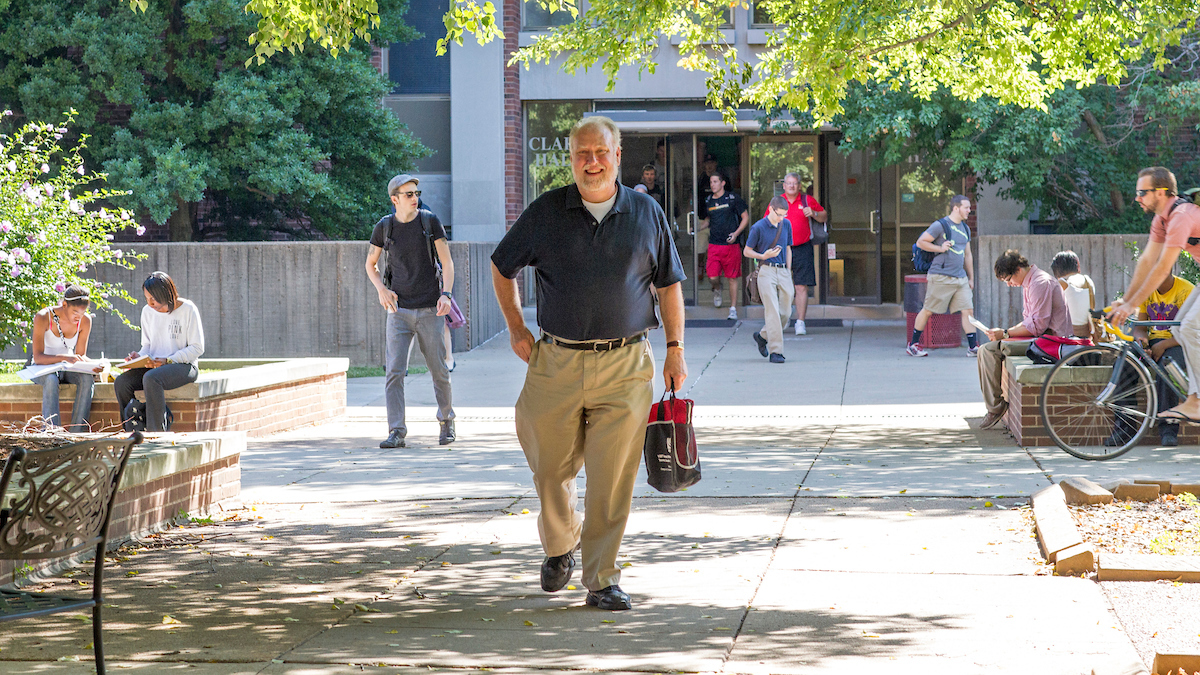
Political scientist Dave Robertson appeared on the Kansas City-based radio show “Up to Date” to discuss the issue of partisan gerrymandering. (Photo by August Jennewein)
Debate over partisan gerrymandering has surfaced all across the country with activists in several states bringing legal challenges to existing electoral maps they argue were drawn illegally with the aim of locking opponents permanently out of power.
The U.S. Supreme Court already let stand a Pennsylvania Supreme Court ruling overturning the state’s congressional district map ahead of the 2018 election, and the Court has cases on the docket from Maryland, Wisconsin and Texas.
Dave Robertson, chair of the Department of Political Science at the University of Missouri–St. Louis, joined host Steve Kraske and St. Louis Public Radio | 90.7 KWMU reporter Jason Rosenbaum for an in-depth look at gerrymandering during Monday’s episode of the Kansas City-based radio show “Up to Date” on KCUR (89.3 FM).
The discussion began by defining the issue.
“It’s a practice of drawing lines in a way that packs together a party’s opponents or cracks a district that has a lot of your opponents in it and spreads them across your own supporters’ districts,” Robertson told the audience. “It can really help a party pick up some seats in the legislature, and that helps them pick up power.”
There also are misunderstood aspects of the debate, including the belief that a court decision to stamp out gerrymandering will put every race in play.
“You’re not going to achieve that because of the geography, which is much more important than the way the district lines are drawn,” Robertson said, pointing to how in states such as Missouri, Democratic voters tend to be clustered in urban areas with rural districts controlled by Republicans.
“The other part of this that matters is incumbency,” he added. “Incumbents generally win reelection. They have big advantages over people who are challenging them or the two challengers in an open seat, so between geography and incumbency, the ability of a demographer to come in and make these districts perfectly balanced is really unlikely, but that demographer can cut the margin.”
The goal, then, would be to make voting districts that leave representation more in line with the overall voting makeup of the state. So if 55 percent of the state’s votes are cast for Republicans, the party controls about 55 percent of the legislative seats.
Robertson explained that states have a lot of say in the way redistricting is done, and the only federal requirements are that population of each district must be roughly the same and that the districts don’t violate the voting rights act.
How willing the Court ultimately will be to involve itself in the process remains to be seen.
“The Court doesn’t want to step on the procedures of the states,” Robertson said. “But at the same time, the outcomes in some of these states are so serious that they’re beginning to feel that for the legitimacy of the republican system – that’s with small r, republican – they need to do something. So I think it’s a really open question as to which way it’s going to go.”
To hear the whole discussion of gerrymandering, click here.














